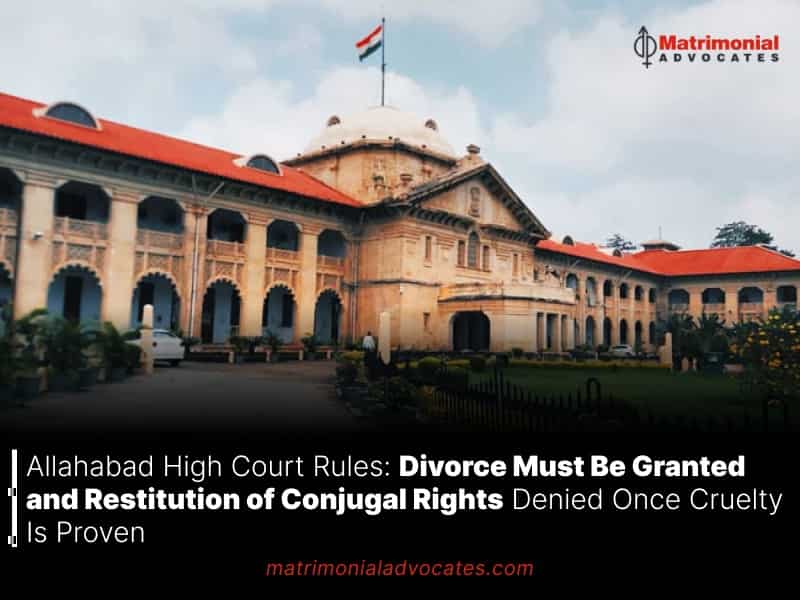
The Allahabad High Court has ruled that once cruelty is established, a divorce decree must be issued, and any suit for restitution of conjugal rights must be dismissed. This ruling was made by the Lucknow Bench in a series of appeals filed under Section 19(1) of the Family Courts Act, 1984, alongside Section 28 of the Hindu Marriage Act, 1955 (HMA). The appeals were brought by the husband, who challenged the Family Court’s judgment that dismissed his suit for the dissolution of marriage and instead decreed in favor of the wife’s suit for restitution of conjugal rights.
A Division Bench comprising Justice Rajan Roy and Justice Om Prakash Shukla held, “… we have no hesitation in determining that once cruelty was proved, the suit for divorce had to be decreed and the suit of the wife had to be dismissed, subject of course to the provision of Section 13A of Act, 1955, but, the Family Court has erred on facts and law in not doing so. The point of determination is answered accordingly.”
Advocate Rohit Tripathi appeared as counsel for the appellant, while Advocate D.P. Singh Somvanshi represented the respondent.
Factual Background: The appellant, identified as the husband, and the respondent, his wife, contracted marriage in the year 1986, resulting in the birth of two sons. The appellant alleges that subsequent to the birth of their children, the respondent evinced disinterest in their marital relationship and began displaying conduct tantamount to cruelty towards him, including instances witnessed by household staff and family members. Specific accusations include the respondent’s act of confining the appellant within a lavatory, baseless allegations of extramarital relations with a neighbor, verbal abuse directed at the appellant’s parents, and deliberate deprivation of sustenance.
Since 2003, the parties have maintained separate residences while cohabiting under the same roof. Consequently, the appellant initiated legal action under Section 13 of the Hindu Marriage Act (HMA) seeking annulment of the marriage. In response, the respondent lodged multiple legal proceedings against the appellant, invoking provisions of the Domestic Violence Act, Section 125 of the Criminal Procedure Code (CrPC), various sections under the Indian Penal Code (IPC), and the Dowry Prohibition Act. Additionally, the respondent initiated legal recourse seeking restitution of conjugal rights. The adjudication at the Family Court level resulted in a favorable decree for the respondent, prompting the appellant to pursue judicial recourse through an appeal before the High Court.
The High Court in the above context of the case noted, “It is apparent that Section 13 of the Act, 1955 provides for grant of divorce and enumerates various grounds on which the same may be granted. It enacts that “any marriage solemnized whether before or after the commencement of this Act’ may be dissolved on petition presented either by the husband or by the wife or any of the grounds specified therein. Clause (i-a) of sub section (1) of section 13 of the Act, 1955 declares that a decree of divorce may be based by a court on the ground that after solemnization of marriage, the opposite party has treated the petitioner with cruelty subject to the State amendments to Section 13 (1) (i-a) in this regard. There are other grounds also mentioned in the said sub section (i) of section 13 of Hindu Marriage Act and each of these grounds are independent of each other.”
The Court observed that each ground stands independently, as evidenced by the use of the disjunctive ‘or’ to differentiate them. There is no justification for interpreting ‘or’ in a conjunctive manner, as such an interpretation would yield illogical results. Thus, cruelty alone can serve as ample justification for the termination of a marriage.
“However, it seems that learned Family Court, after returning a finding that “cruelty” has been inflicted by the respondent-wife on the appellant-husband, refused to grant divorce to the husband presumably on the ground that the ground of “desertion” could not be proved by the appellant-husband”, it said.
Furthermore, the Court observed that rather than granting the petition for divorce, the Family Court opted to decree the respondent’s plea for the restitution of conjugal rights. This decision was deemed incongruous and irreconcilable with the established findings of cruelty in favor of the appellant/husband within the context of the divorce proceedings. The Court underscored that such findings constituted a valid and reasonable cause, as per Section 9 of the Hindu Marriage Act, for the husband’s refusal to cohabit with the wife, thereby necessitating the dismissal of the wife’s petition under the same section of the Act. However, this significant consideration was unfortunately overlooked.
“… it is not a fit case for grant of alternative relief of judicial separation under Section 13A of the Act, 1955. … The marriage between the appellant and respondent is dissolved. Liberty is granted to the respondent to initiate separate proceedings under Section 25 of the Act, 1955 as per law”, it concluded.
As a result, the High Court granted the appeals and reversed the challenged judgment and decree.





